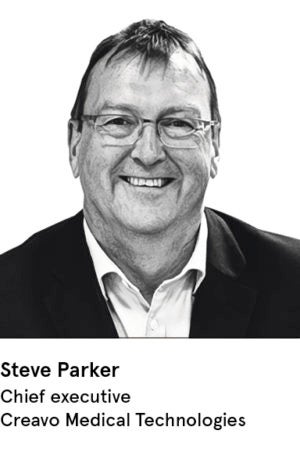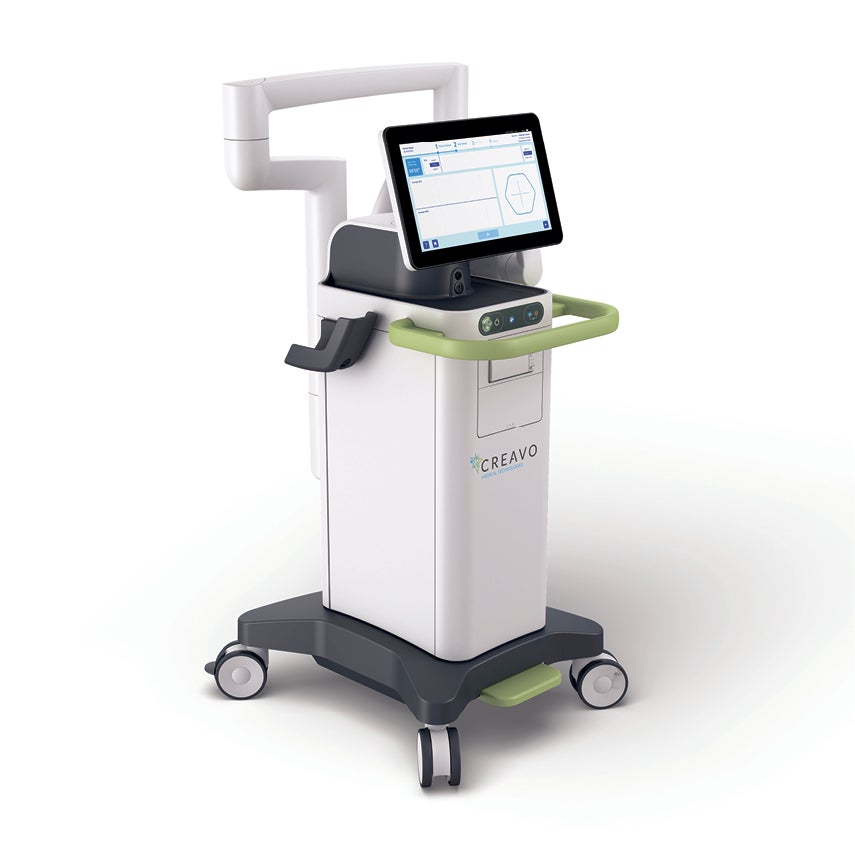 Creavo Medical Technologies has created an ingenious application of quantum physics that helps physicians to rule out ischaemic heart conditions in patients presenting at emergency departments with chest pains.
Creavo Medical Technologies has created an ingenious application of quantum physics that helps physicians to rule out ischaemic heart conditions in patients presenting at emergency departments with chest pains.
Around 900,000 people who attend emergency departments with chest pains in England and Wales eventually require no further treatment, but they are put on a pathway that involves a battery of tests of up to five hours, leading to a potential hospital stay.
“Up until now, there has been no way of ruling these patients out of a cascade of cardiac tests, so they clog up already overcrowded and under-stress departments, placing hospitals under huge economic strain,” says Steve Parker, Creavo’s chief executive.
“Vastly experienced emergency department physicians usually know from instinct which patients have heart disease and which haven’t, but there is no test they can do to definitively send them home, so the patient must enter the cardiac chest pain pathway. It is time consuming, expensive and frustrating for the physician and the patient.
This area is probably the most significant unmet healthcare need in hospitals in any country with a developed healthcare system
“But our technology detects a healthy heart and we can do that in a five-minute scan. It can help rule out those who do not need further treatment or diagnostic tests, so they can be discharged immediately.”
Creavo’s award-winning Corsens system, which measures electromagnetic fluctuations generated by the activity
of the heart, has produced positive results from early trials. A much larger study is under way at five busy hospitals in England and it has just started clinical trials in five US hospitals.
The groundbreaking magnetocardiography (MCG) technology has garnered a series of accolades, including two at the prestigious Institution of Engineering and Technology Innovation Awards in November last year, while business confidence is such that the company has raised an impressive £20 million in investment in the four years since it was created as a spin-out from the University of Leeds.
The non-invasive device, a compact portable unit that can easily be wheeled to a bedside, works by placing a dinner-plate-size sensor above the patient’s chest area, through normal clothing, to pick up subtle outputs from the heart’s magnetic field generated by its electrical impulses. It is calibrated to identify patterns and confirm that the heart is functioning normally.
“We are the only medical diagnostic, which can be deployed in emergency departments, that can detect normality while everything else is looking for a problem,” adds Mr Parker, a cardiology and medtech industry veteran, who is helming the company’s rapid progress towards market launch expected early next year.
“This area is probably the most significant unmet healthcare need in hospitals in any country with a developed healthcare system.”

Creavo’s Corsens was also welcomed at the recent European Society for Emergency Medicine conference in Glasgow.
Research would suggest that a typical hospital seeing 300 patients a day in its emergency department could save at least £500,000 a year. Larger hospitals stand to save significantly more. Further studies show that 140 hospitals would have paid back their investment in the technology in four months.
The spark for the technology breakthrough came when Professor Ben Varcoe of the University Leeds School of Physics and Astronomy suffered heart trouble and was told by his cardiologist at the end of a busy clinic: “At last, someone with a genuine problem.”
The burden of pushing a procession of patients through cardiac testing and then follow-up clinic appointments was explained, and Professor Varcoe set to applying his knowledge of quantum electrodynamics to map the electrical signals of a healthy heart.
Abnormal patterns in the magnetic fields reflect a loss of oxygen to the heart muscle (ischaemia), indicating the need for further tests and treatment while a heart free from ischaemic issues emits a different set of signals that are picked up by the device.
The company, which is based in Coventry and has Professor Varcoe as its chief scientific officer, is driven by a strong support team built around translating the original vision into an effective and easy-to-use device.
“I have been in cardiology for around 40 years and this is probably the most exciting development I have witnessed,” says Mr Parker. “This has the scope to make an instant change for emergency departments, have a positive impact on hospital balance sheets and save patients from the uncertainty of needless testing.
“It is a British success story with technology developed at Leeds University with the first trials done at Leeds General Infirmary, spun out into a Midlands company and our major investor, IP Group, is a British fund. But, most importantly, it is something we can take to the world.”
Creavo is now a dynamic force in a £4-billion technology market across Europe and United States, and its development scientists have identified another eight cardiac areas where the platform can be utilised. The issue of sudden cardiac death, which claims 4.25 million lives a year, is the next sector it will tackle.
“The potential of our technology is a compelling story, which is why we have investors from around the world,” Mr Parker concludes. “The business case is established, we have clinical evidence with more to come and key opinion leaders back it because they see it as game-changing technology.”
For more information please visit creavomedtech.com


